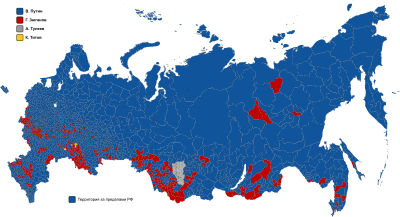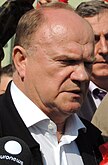Russian presidential election 2000
|
|
|||||||||||||||||||||||||
|---|---|---|---|---|---|---|---|---|---|---|---|---|---|---|---|---|---|---|---|---|---|---|---|---|---|
|
|||||||||||||||||||||||||
| Turnout | 68.6% |
||||||||||||||||||||||||
|
|||||||||||||||||||||||||

Constituencies won by Vladimir Putin
Constituencies won by Gennady Zyuganov
Constituencies won by Aman Tuleyev
Constituencies won by Konstantin Titov
|
|||||||||||||||||||||||||
|
|||||||||||||||||||||||||
Presidential elections were held in Russia on 26 March 2000. Incumbent Prime Minister and acting President Vladimir Putin, who had succeeded Boris Yeltsin on his resignation on 31 December 1999, was seeking a four-year term in his own right and won the elections in the first round.
In spring 1998, Boris Yeltsin dismissed his long-time head of government, Viktor Chernomyrdin, replacing him with Sergey Kirienko. Months later, in the wake of the August 1998 economic crisis in which the government defaulted on its debt and devalued the rouble simultaneously, Kirienko was replaced in favor of Yevgeny Primakov. In May 1999, Primakov was replaced with Sergei Stepashin. Then in August 1999, Vladimir Putin was named Prime Minister, making him the 5th in less than two years. Putin was not expected to last long in the role and was initially unknown and unpopular due to his ties to the Yeltsin government and state security. In the late summer and early fall of 1999, a wave of apartment bombings across Russia killed hundreds, injured thousands. The bombings, blamed on the Chechens, provided the opportunity for Putin to position himself as a strong and aggressive leader, capable of dealing with the Chechen threat.
Yeltsin had become exceedingly unpopular. Yeltsin was increasingly concerned about the Skuratov and Mercata and Mabetex scandals that had prompted articles of impeachment. He narrowly survived impeachment in May 1999. In mid 1999, Yevgeny Primakov and Yuri Luzhkov were considered the frontrunners for the presidency. Both were critical of Yeltsin, and he feared that they might prosecute him and his “Family” for corruption should they ascend to power. Primakov has suggested that he would be “freeing up jail cells for the economic criminals he planned to arrest.” On December 19, 1999, the Kremlin’s Unity Party finished second in the Parliamentary elections with 23 percent; the Communist Party was first with 24 percent. By forming a coalition with Yabloko and the Union of Right Forces, Yeltsin had secured a favorable majority in the Duma. By the December election, Putin’s popularity had risen to 79% with 42% saying they would vote for him for President. On New Years Eve 1999, Yeltsin announced that he would be resigning early in the belief that “Russia should enter the new millennium with new politicians, new faces, new people, who are intelligent, strong and energetic, while we, those who have been in power for many years, must leave.” Putin would be acting president. The elections would be held on 26 March 2000. In early 2000, Unity and the Communist Party had developed an alliance in the Duma that effectively cut off Putin’s rivals, Yevgeny Primakov, Grigory Yavlinsky, and Sergei Kiriyenko. Yuri Luzhkov, the reelected Mayor of Moscow, announced that he would not compete for the presidency; Primakov pulled out two weeks after the Parliamentary elections. The early election also reduced the chances that public sentiment would turn against the conflict in Chechnya.
...
Wikipedia



